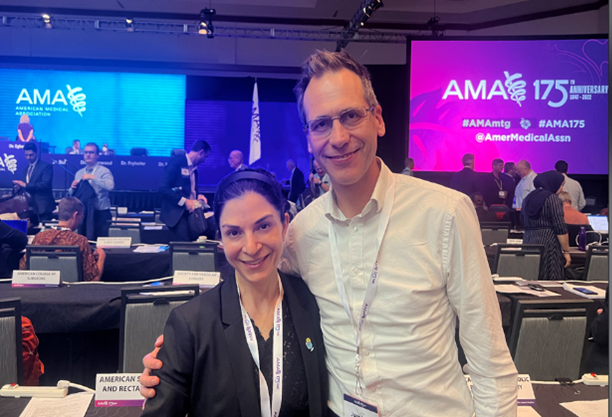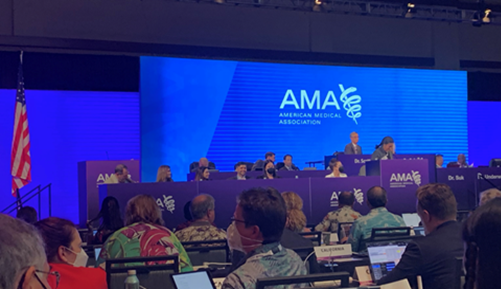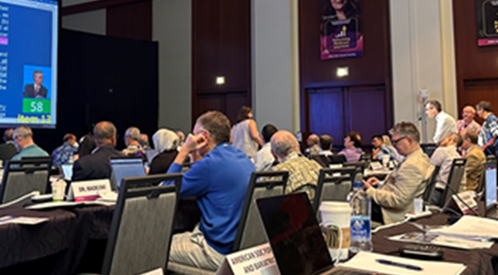ASCRS participation at the AMA House of Delegates (HOD)November 2022 Interim Meeting
ASCRS Delegates: Anne Mongiu M.D. and Lucas Poggio M.D.
ASCRS Alternate Delegates: Paul Johnson M.D., Sachin Vaid M.D.
House of Delegates Facts:
- The HOD is the legislative body of the American Medical Association (AMA)
- Delegates represent state medical societies, various subspecialty societies and government
- Delegate count is based upon the number of AMA members within each state/society – ASCRS has 2 Delegates and 2 Alternate Delegates
- ASCRS Delegates are part of the Digestive Disease Section Council (DDSC)1
- The House of Delegates (HOD) meets twice a year to introduce and debate new resolutions which can become AMA advocacy policy, as well as modify and (re)affirm existing AMA policy
- Resolutions are grouped into “reference committees”2 by subject matter to facilitate further review and deliberation
- Resolutions for new advocacy and modifications to existing AMA policy are introduced a few weeks in advance of each meeting to a public website where it can be reviewed and commented on in an open forum by AMA members and member societies
- Prior to the start of business of the annual meeting, the reference committees summarize all the testimony offered in the open forum
- The first portion of the meeting itself, then involves labor-intensive review of each resolution line by line with open testimony on the floor of the HOD
- The reference committees carefully summarize all the testimony given and adjust/amend the resolutions to match the will of the house as testified
- The entire house meets as a whole after review the reference committees work, and vote either to accept the judgement the reference committee or to bring individual items are parts of items to the floor of the house for open to be voting
- At the end of the meeting all proffered resolutions are accepted, amended, overruled, or referred for further study/decision
November 2022 Meeting Update:
Prior to the meeting, ASCRS delegates and alternate delegates vet all proffered resolutions and identified 20 (of > 100 proffered) that would be most relevant to Colorectal surgeons and their patients.
 Day 1: Activities at the Digestive Disease Section Council (DDSC):
The ASCRS received DDSC support for:
Day 1: Activities at the Digestive Disease Section Council (DDSC):
The ASCRS received DDSC support for:
- Resolution 819: advocating for the implementation of updated US preventative services task force recommendations for colorectal cancer screening among primary care physicians in major payers by the AMA
- Resolution 817: promoting oral anticancer drug parity
- Resolution 808: Reinstatement of consultation codes
- Resolution B201: Physician reimbursement for interpreter services
The ASCRS received partial support from some DDSC members but not the full backing of the Council:
- Resolutions 310 and 316: AMA backing of certifying/recertifying organizations
Day 2: Reference committees systematically review resolutions and hear oral testimony3
Dr. Poggio: gave oral testimony on items J817, J819, C31
Dr. Mongiu: served as a member of Reference Committee J hearing all resolutions
 Day 3 and 4: Debate on the resolutions proffered by the Reference Committees1:
Day 3 and 4: Debate on the resolutions proffered by the Reference Committees1:
The Caucasus, Councils, and subspecialty societies subsequently meet on Monday morning to review the final resolutions proffered by the reference committees, identifying those with which they agreed, and those on which they would elect to call out for further debate on the floor.
 Reference Committee J:
Resolution 816:
Reference Committee J:
Resolution 816: Supporting coverage of continuous glucose monitoring devices for patients with diabetes - Adopted
Resolutions 817: Promoting oral anti-cancer drug coverage parity – Adopted after testimony and amendment
Resolution 819: Advocating implementation, education, and coverage of USPSTF colorectal cancer screening guidelines - Adopted after testimony and reference committee amendment reaffirmed
Resolution 808: Reinstatement consultation codes – Reaffirmed with stronger language
Resolution 810: Concerning transparent negotiations for Medicare drug pricing, patent evergreening, and blocking direct to consumer advertising – Reaffirmed with stronger language
Reference Committee B:
Resolution 201: Reimbursement for interpreter services, expanded to include ASL -Adopted and amended
Resolution 205: Supporting elimination of waiver of due process clause is from physician contracts – Adopted and amended
Resolution 223: Broadening the AMA stance against criminalization a pregnancy loss as a result of medical treatment (such as treatment for colon cancer) – Adopted and amended
Resolution 224: Providing insurance coverage for fertility treatment, especially in the case of iatrogenic infertility (such as IPAA) -Adopted and amended
Reference Committee C:
CME 1: Impact of private equity
- Recommended for adoption and supported by the ASCRS delegates
- This is very important for our society. Investment by PE (private equity) in health care is increasing and can affect training programs
- Example: The closed Philadelphia Hahnemann University Training Program in 2019 required significant efforts from ACGME and AMA to ensure trainees were able to continue with their training despite needing to change institutions
CME 2: Mitigating demographic and socioeconomic inequities in the Residency and Fellowship selection process
- Recommended for adoption and supported by the ASCRS delegates
Resolution C302/303 and 308: Address employee leave to include miscarriage and stillbirth along with medical student leave and paid family/medical leave in medicine
- Amended and significant changes were implemented and adopted
- Asking for a study of the feasibility of incorporating into their parental leave policies for a 12-week minimum leave allowance
- Supported by the ASCRS: it addresses parental, family and medical necessity leave for medical students and physicians
Resolution C305: Addresses the need to encourage medical schools to sponsor pipeline programs to Medicine for underrepresented groups had significant changes but essentially encouraged in resolution that medical schools recommend pathways programs for underrepresented students free of charge for example. And it was supported by us.
Resolution C316: Modifying existing AMA policy to have stronger language supporting specialty certification to include boards which both certify and recertify, rather than those who offer to recertify physician previously certified elsewhere
- Spirited debate on the floor with a split result
- A portion of the amended language was accepted and the stronger verbiage was moved for referral back to the reference committee for further review
- Some Societies voiced resistance to current ABMS recertification citing physician "burn out" and "cost"
- The specialty certification issue will likely continue to arise at future meetings with need for continued work on the part of the ABMS and Specialty Societies/ASCRS to advocate for
Reference Committee K:
Resolution K902: Addresses recommendations to reduce the burden of incarceration on Public Health
- Supported by ASCRS delegates and recommended for adoption with amendments
- These amendments include but are not limited to address the need for a livable wage and access to affordable housing opportunities - these issues often impact successfully returning into society.
Resolution K916: ASCRS provided oral testimony for expanding HPV associated cancer prevention from cervical cancer to include specific language which relates to our work in screening patients for HPV-related anal cancer including but not limited to patients with anal dysplasia and anal cancer secondary to HPV infection
NOTES:
1.
The DDSC is comprised of delegates from the American College of Gastroenterology, American Gastroenterological Association, American Society of Gastrointestinal Endoscopy, Society of American Gastrointestinal Endoscopic Surgeons, ASCRS, and American Society for Metabolic and Bariatric Surgery, and comprises ~20 delegates. The Chair of the DDSC is rotated between the medical and surgical societies. ASCRS will be chair during the 2025/26 meeting season. The benefit of DDSC backing on resolutions means the voice of our two-delegate society is amplified to include the entire membership of the DDSC when giving oral testimony in the HOD. Testimony delivered on behalf of section counsel carries more weight than an individual or small society in the ultimate decision making performed by the reference committee.
2. The subject matter referred to each reference committee is as follows:
● Reference Committee on Amendments to Constitution and Bylaws (Constitution;
Bylaws; Ethics)
● Reference Committee A: Medical Service (Annual Meeting only)
● Reference Committee B: Legislation
● Reference Committee C: Medical Education (Annual Meeting only)
● Reference Committee D: Public Health (Annual Meeting only)
● Reference Committee E: Science and Technology (Annual Meeting only)
● Reference Committee F: AMA Finance and Governance
● Reference Committee G: Medical Practice (Annual Meeting only)
● Reference Committee J: Advocacy related to medical service, medical practice, insurance
and related topics (Interim Meeting only)
● Reference Committee K: Advocacy related to medical education, science and public
health and related topics (Interim Meeting only)
3. At the end of the day, the delegates are dismissed, and the reference committee members spend the evening reviewing the testimony and writing/rewriting the resolutions to match the spoken testimony and submit